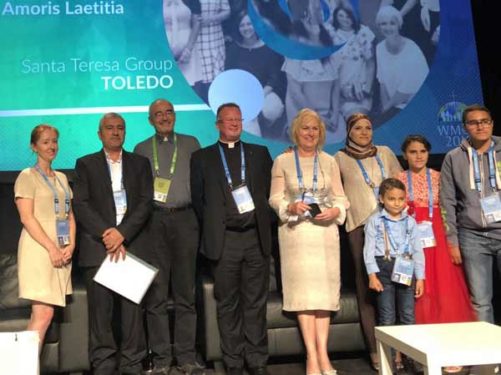by Christopher White, The Tablet’s National Correspondent

DUBLIN — In the lead-up to this week’s Vatican-sponsored World Meeting of Families, some critics charged the focus was too narrowly on Ireland. Those detractors received a response on Wednesday morning, when an opening session dealt with how refugees might help restore stronger familial bonds all across the globe.
In “Nowhere to Lay his Head: a Christian Response to Migrants and Refugees,” Pope Francis’ point man on the topic said that the pontiff’s 2016 apostolic exhortation “Amoris Laetitia,” which serves as the touchstone of the global meeting, is a call to think beyond immediate family units and to consider the collective human family.
“’Amoris Laetitia’ stimulates us to reflect deeply on the meaning of family in our community and society, where we might take hearth and home for granted,” said Jesuit Father Michael Czerny, undersecretary for the Vatican’s office on Migrants and Refugees.
“Our Lord identifies totally with those who are forced to flee,” Father Czerny said, adding that too often the focus is on how the world aids refugees, without reflecting on what refugees and migrants are able to offer the rest of the world.
“Vulnerable migrant families are not just needy and deserving of our mercy,” he continued. “Migrant families themselves also welcome, they can help protect the vulnerable, promote the integral human development of others, and might end up better integrating those who originally let them in.”
One such family was on hand in Dublin on Wednesday, where Ammar Zaitoun spoke about how, along with his wife and three children – who joined him on stage for the panel – he fled from their homeland of Syria in 2015.
The Muslim family of five traveled first to Turkey and then onwards to Greece, via a “journey of death” at the hands of human smugglers who carried 50 passengers in a boat built for less than half that across the Mediterranean.
“The screams of the women and children still echo in my ears,” said Zaitoun, as he described their harrowing passage.
After two years in Greece, they were resettled to Ireland with the support of the United Nations and the European Union, and standing on the dais of the largest event to take place in Europe this summer, Zaitoun seemed to still be in awe of how far they’ve come.
“I would like here to thank the great Irish people and the government for their good reception,” he told attendees.
‘Duty to Care’
One of those Irish citizens providing a welcome to the Zaitoun family is Mena Doherty, who also joined the Wednesday panel. She is a volunteer with Syrian refugees in her community and encouraged her fellow Catholics to consider doing the same as a part of their “duty to care.”
Among the practical ways that she suggested refugees could help the rest of the world is through a rediscovery of the family meal.
She went on to describe both the preparations for the family meal that often involve multiple family members and the willingness that she’s seen in her new Syrian neighbors to linger for hours at a shared table discussing their values and their concerns, along with their daily lives.
Global Love and Solidarity
Father Mark Madden of the archdiocese of Liverpool, England, who has spent considerable time working with refugees in the Middle East, brought the discussion full circle by noting that “Amoris Laetitia” is also a call to “be loving in our relationships.”
“That includes global love and solidarity,” Father Madden emphasized.
“The first response that a Christian must make toward refugees is to love them as brothers and sisters made in the image and likeness of God,” he continued. “It’s the message of Pope Francis in ‘Amoris Laetitia,’ but it’s also the call of Christ.”
Father Madden added that at a time in which family life is eroding around much of the world, “one of the most enriching things about working with refugee families is that they show us how to be a true and proper family.”
“They enrich our community and should enrich our family life in ways that maybe we have lost a long, long time ago,” he insisted.
Czerny said that although refugees remain an underserved and marginalized population, the international community had recently advanced a Global Compact for Migration, which, if embraced, could make the journey of families like the Zaitouns, “more human, more just, and less dangerous.”
In concluding the event, he said that caring for migrants and refugees isn’t just the responsibility of the international community, but one that the Church must fully embrace, as well.
Church of Accompaniment
“May our Church learn more and more to accompany people on the move – such as migrants, refugees, and victims of human trafficking,” he pleaded. “May it thus become a Church ever better able to accompany all families undergoing a process of rapid transformation.”
“Migrant ministry is an excellent laboratory in which the whole Church can learn to be more adept and more capable in accompanying the whole people of God, today and in the future – a future which will probably be even more accelerated than the present.”
